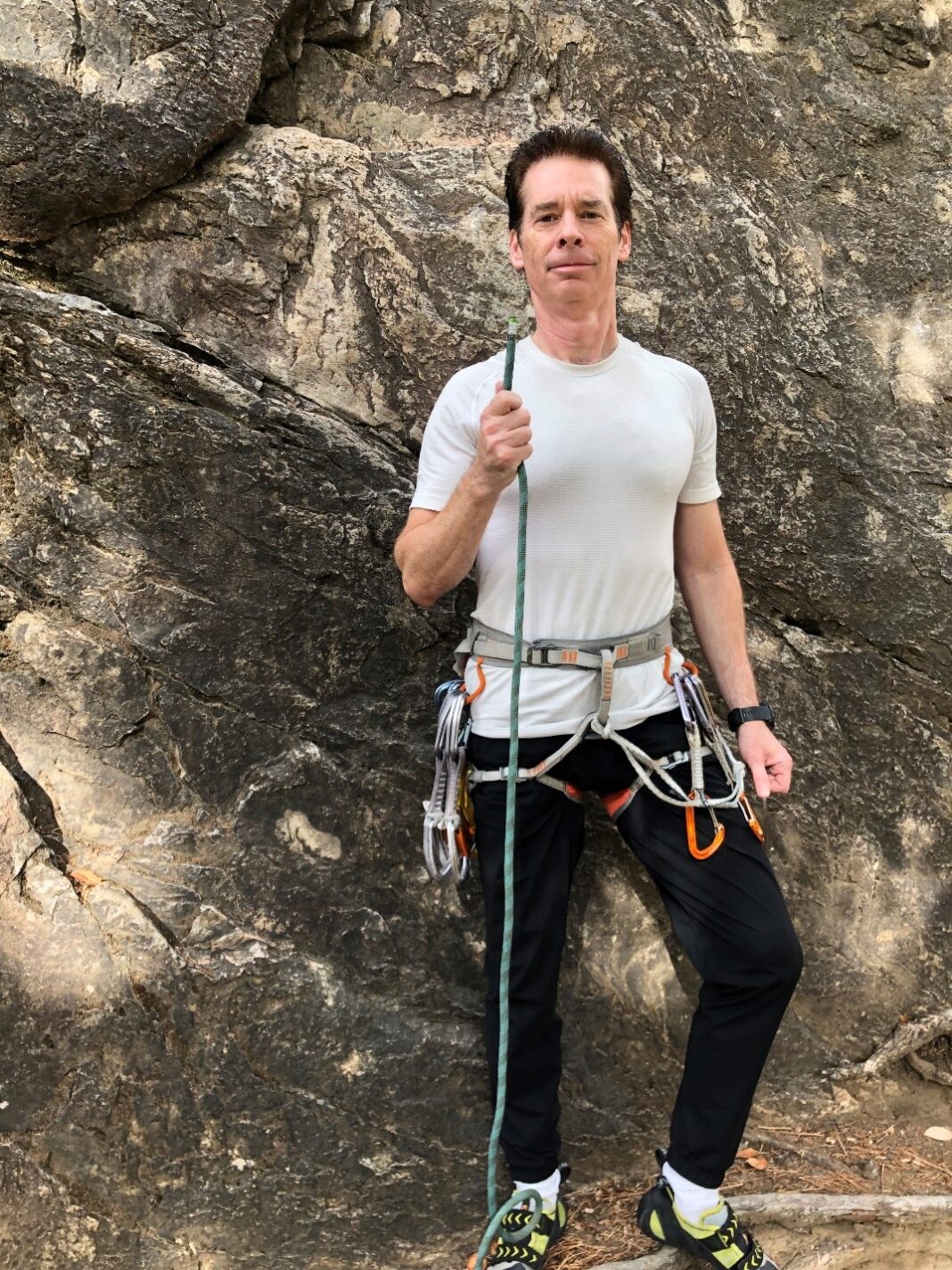When the rope is all below you, trailing down the vertical passage of hard and unforgiving rock, and you reach up to ascend another step toward the sky, it is said that you are on the sharp end of the rope. It is sharp with consequence and responsibility, for the consequence and responsibility are all yours. You are the author of your situation and only you can manage what happens next. You, the laws of physics, and yourself. The outcome, a successful climb or disaster, a day of fear or cool triumph is all on you, on your physical skills, your preparation, and most of all on your mental state. And yet, this potentially stressful position is the most coveted in all climbing, because to climb well on lead is to enter the mythical and much discussed “zone”, a flow state of the now, a place of balance with challenge, skills, practice, and a timeless, perfect concentration. It is Zen in action, it is tau, it is meditation in motion, and it is one of the most beautiful states a human being can achieve.
In many ways, climbing on lead is a metaphor to life. It is the CEO finding time to balance all the demands on their attention, managing the many uncertainties in business, shelving their ego and protecting their employees from their own emotional needs and putting those employees first, putting their company first, holding in line and handling appropriately their own internal stresses. The sharp end is like a parent using care, purpose, and calm in teaching their child. Just the right amount of hands on – not too much, not too little, and all the while managing their own issues. Everyone who takes responsibility for their own lives, for their individual happiness and meaning, is, in some way, on the sharp end. For the sharp end is about being responsible.
But the best way to survive on the sharp end, to thrive there for any length of time, is to achieve the zone. And I was approaching the wall after a difficult summer, one in which I felt I had lost that beautiful flow state to self-doubt.
Unquantifiable chance of death
I have experienced difficult situations before. I had nearly died of a viral pneumonia when I was 25 years old and was subsequently afflicted by several instances of high-altitude pulmonary edema. We only later found out that the pneumonia and subsequent pulmonary issues had a rare root cause: I was born without a right pulmonary artery, and only oxygenate normally out of my left lung. Numerous lower respiratory infections scarred what remained until I could no longer oxygenate properly under exercise. I found that it was possible for me to bring on a pulmonary edema simply by working too hard, running too hard, or applying too much willpower to my physical endeavors. But these issues did not stop me from completing an ironman triathlon, despite my respirologist’s most optimistic clearance letter saying that participation in such activity carried with it an “unquantifiable chance of death.” This statement became my secret motto. Unquantifiable chance of death. That sounded like all of life to me. We all have the ability to end our own lives through the power of our own will. Or as an unintended consequence of it. And yet, despite facing death on several occasions, I found myself this summer more discouraged and distracted than I had ever been in my adult life.
Exploration of self
At every experiencing moment in our life, we have the opportunity to explore our sense of self. Walking to the rock face, I had to consider why I had been so unsettled over the summer. I could not think to climb lead, to take on the sharp end of the rope, with unresolved emotional issues. In such a mental state, I could not achieve the zone, find comfort, or perhaps even succeed uninjured in the climb. I looked inward and realized that the second summer of COVID had been weighing me down. With two cancellations of Ironman Canada, I had insufficiently challenged myself. I was also into the fourth year since leaving behind my career of 28 years as a geophysicist to become a writer. I was sitting in the doldrums of having successfully written a fantasy trilogy but not having a sufficiently passionate goal in front of me. I realized that I needed to make peace with my new place in the world and take up a new challenge.
My example is hardly one of suffering, but it is also not uncommon. Some people might call what I just described as a mid-life crisis, though giving it a name has a way of making it sound trivial. And angst of purpose is anything but trivial. Everyone must feel a sense of purpose and challenge in their lives, and anyone at any age, from CEO to parent to child, can question their place in the world. Carl Jung said, “As far as we can discern, the sole purpose of human existence is to kindle a light in the darkness of mere being.” [1] Without this sense of meaning, we are unlikely to find the zone, to thrive on the sharp end of the rope, or to find any happiness at all.
The zone
The zone, or flow, is a state of consciousness where optimal functioning occurs. [2] According to the architect of the zone, Mihaly Csikszentmihalyi, this state involves total absorption in task. [2] The zone is commonly described as part of athletic peak performance, but this state may apply to any sufficiently challenging activity, mental or physical, including writing, leading, problem solving, and parenting. The state of being in ‘the zone’ is highly desirable, not just because it produces peak performance, but because it is also a peak experience. [2] Individuals in the zone may feel their ego “fall away” in a state of timelessness, and an enhanced and effortless concentration to such a degree that “nothing else matters”, that “their whole being is involved.” The zone is so fulfilling that many people feel it brings them to new and unexpected states of consciousness. [2]
Entering the zone requires both specific personal attributes and attitudes, and a balancing of challenge and skill. The chart below illustrates Csikszentmihalyi’s much discussed challenge-skill balance. If an individual has too little challenge and too little skill, they may experience apathy. They do not care and lack the tools to create change, a situation that is definitively meaningless. If the challenge is too low and an individual is too skilled, they will be bored. Neither of these low-challenge states would feel like being on the sharp end of a rope. On the other hand, too high of a challenge and too low a level of perceived skill will result in anxiety.
The perfect state, the zone, may only occur when both challenge and skill are high. This state is being on lead, and enjoying it, totally involved, and absorbed. It is being fully in the now, on the tightrope of achievement and perfect mental concentration. It is interesting that to have even a chance of getting to the zone, we must be sufficiently challenged and sufficiently prepared.
In a previous article https://big-media.ca/examining-the-gender-lens-and-the-women-in-cleantech-challenge/, I described the Women in Cleantech Challenge (WIC), which is aimed at finding and helping to develop top female entrepreneurs in the field of clean technology. Building an innovative technology company is unequivocally challenging, thus the WIC contest provided extensive supports in advice and mentorship to help develop the skills of the top contestants. [3]
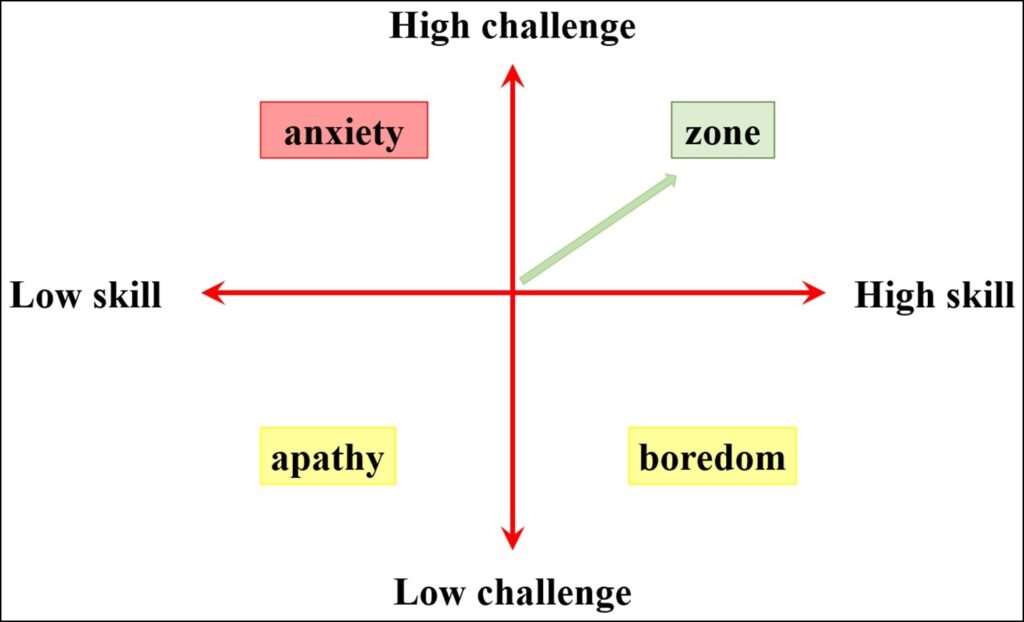
There are circumstances and attitudes that make achieving the zone more likely. [2] These attributes have been studied for decades and are disseminated in articles by sports psychologists and CEO coaches with very similar language. An understanding of the factors necessary to achieve the zone was reached through extensive surveys of elite athletes and subsequent inductive analysis. [4] The chart below summarizes these findings.
Of all these factors, two of them were found to be statistically co-equal in importance: (1) planning and preparation for an event or competition and (2) confidence and a positive attitude. Respondents in the surveys felt that planning and preparation helped them focus into a more automatic functioning on the event, which was key to attaining the zone. Confidence was expressed in many ways, with one respondent specifically saying, “The most important [factor] is the feeling that I’ve got the ability to be in that situation.” [4]
Not being prepared was the single biggest factor in preventing respondents from achieving the zone.
This work also found that most respondents felt that achieving the zone was controllable with these factors being the most relevant.
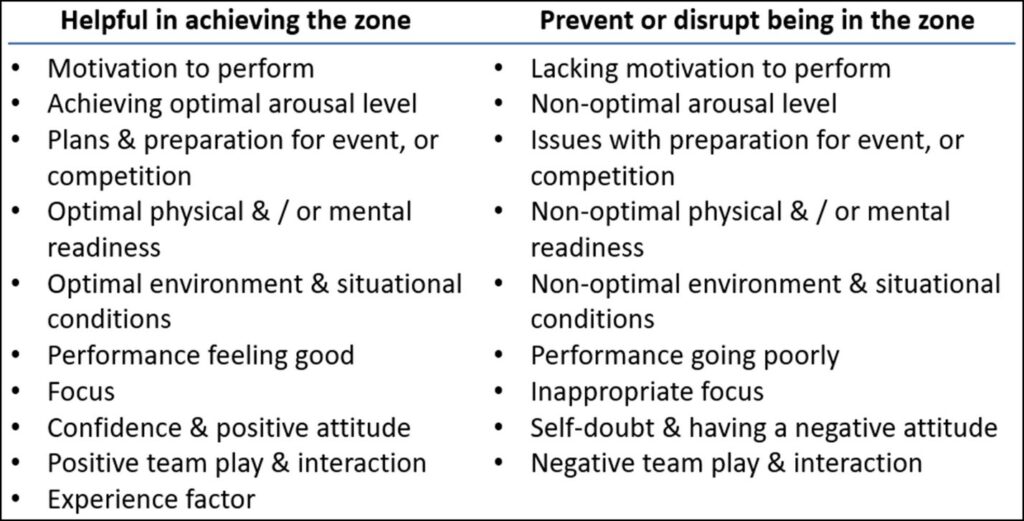
The keys to athletic performance and performance in the boardroom, or as a parent have many similarities. CEO management articles often cite the difficulties of handling stress, including social isolation and the severe lack of time. [5] Some parents may well cite the same issues. A recent LinkedIn article on “CEO Stress Mastery” specifically singles out several factors related to handling stress that are identical to those needed to achieve the zone. It identifies: (1) preparation for the next day, (2) using positive self-talk (think confidence and a positive attitude), and (3) finding focus through “getting quiet” or leaving work at the office. In conformance with this argument, the WIC challenge provided training to its top six candidates specifically to help them attain the skills and preparation they would need to succeed. [3]
Csikszentmihalyi believes that achieving the zone in familial relations is critical in not only teaching children problem solving and to nurture their innate creativity, but in play within the family and in the enrichment of the familial relationship themselves. [2] Achieving the zone has also been identified as an important skill to teach children, as well as parents, because of its calming effect. [6]
Neither a CEO nor a parent is likely to literally lead the way up a rock face, but the requirements for managing stressful situations in a meeting, in making decisions, or handling children are stressful and require many of the same skills as being on the sharp end of a rope. Any sufficiently challenged and aware human being may find the factors in achieving the zone relevant to achieving their own optimal state of performance.
The climb
I finally arrived at the climbing faces at the Skaha Bluffs of Penticton, British Columbia. With me was my climbing partner, an instructor-level climber. We had both practised leading for the trip, with a few disruptions due to COVID restrictions, and one recent biking accident on my part. We knew our climbing levels. I am a 5.11 climber, which is fairly typical for a casual sports enthusiast, and my partner is just closing on being 5.12 in the Yosemite Decimal System. [7] We also had a climbing guidebook and had been to the Bluffs before, so we could choose appropriately challenging routes.
What I needed most to take with me on the sharp end of the rope was a positive mental attitude. I needed to internalize that my life still had meaning and challenge beyond that of a geophysicist. And I had to own my pure enjoyment of climbing and the skills I had developed over 30 years. I knew that I must allow myself to find the timeless moments of joy and focus on the sharp end of the rope I carried with me.
Day 1
I thought it would be fun to get out for a pre-climb bike ride. The Reservoir Road in Penticton is a punchy, steep climb with seven pitches of inclination well into the double digits, and it is only about an hour long. But 10-15 degrees is steep on a bike and my climbing partner became concerned that the biking would affect his climbing and turned back a little early. His decision to turn back was wise and fit into the psychological aspect of the sharp end: he could not enjoy the biking when he thought it might affect the greater goal of climbing. Obviously implied in the summary of factors necessary to achieving the zone, though not explicitly stated, is that athletes are very concerned with goal setting. My partner knew his goal. But what works for one person may not work for another. I did the bicycle climb. I wanted to suffer physically and feel alive from that suffering. Catharsis was my goal. When I turned to rocket down the hill, slicing the air in a sound and feel I can only describe as euphoric, I knew that I had done something important to prepare myself for the day.
I had needed to let go of my dissatisfaction with myself and embrace the experience to come. Approaching the rock wall an hour or so later, I found that I was prepared. I tied the rope to my harness and made no excuses, denied any negative self-talk, accepted my skills, and embraced the love of life, activity and myself.
Did I achieve the zone on Day 1? I was never bored or apathetic, experienced only a few seconds of anxiety, and hovered – most of the time – close to the zone. The closest I came to feeling it – and perhaps I was there, for my perception of time did change – was during a sequence of moves on lead. I was so involved in the sequence, in knowing what to do and doing it, that I lost all concern with clipping into protection. I did not need protection, I was completely unconcerned with falling, and was utterly focused on movement. My partner hollered at me and I came down to earth metaphorically and reset the protection.
But at that moment, I did not need it. It was perhaps the best part of the climb.
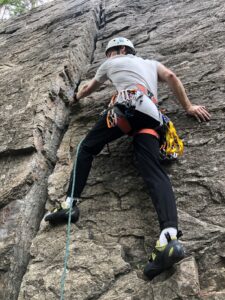
Days 2 and 3
My climbing partner and I experienced a reminder of our physical and psychological differences on the second and third days. One of those differences was illustrated by another of my best moments on the trip: a fall I took attempting a one-arm mantle. Mantling is when you use your arms (or arm, in this case) to push down, holding your body up with the arm, while you bring your foot up to the same feature that your hand is on. It requires both skill and a little strength. I moved sideways out of a crack into a tight mantle and could not get my heel onto the hold by my left hand – there was not enough room, and I ended up blowing off the rock face. It was a good fall. I tried again and succeeded with the mantle by bending my torso to the right, making room for my left foot-hand match. It felt glorious.
My partner was unimpressed by this drama and skipped the mantle, coming out of the crack to the left instead of the right, using a series of small holds and avoiding excessive gymnastics or falls from the rock. His sequence was elegant and less difficult than mine. It also avoided risk entirely.
That fall and subsequent success stayed in my mind as one of my best moments of the trip. It was an interesting lesson in joy, effort, and skill. My partner and I succeeded in different ways, each according to our nature.
We experienced a different lesson on Day 3, when we were each sore and beat up from the previous two days of climbing. One thing about climbing on real rock is that it can cut, abrade, and bruise the climber, and after days of it, the pain can build up. We were climbing a series of 5.10 routes – a little tougher than what we had played with earlier. My finger pads and feet were both very sore. It felt as if someone had tried to sand off my fingerprints. I failed big on the first route. I just could not grab the tiny crimpy holds. Every attempt hurt excessively, and I had to abandon the route. My partner had no such difficulty, however, handling the small holds with relative ease and gracefully reaching the top.
The situation was reversed on the next route, where we had to climb over a small roof. I found a way to do it by employing a somewhat gymnastic heel hook. It was a big, muscular move, but it did not require edging on my toes, which were sore from the previous two days of climbing, or further torment the ends of my finger pads. After the heel hook, I attacked the upper section in a series of strong, committed moves, and finished it quickly and with the feeling of a wild roar. My climbing partner, who had so elegantly climbed the last route – the one I had failed on – could not get comfortable with the heel hook or the upper section’s aggressive nature. The big holds caused his tired hands issues, whereas the small holds did not.
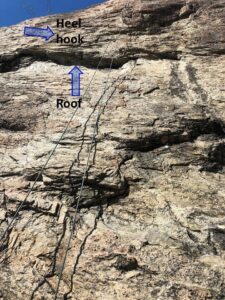
We talked about this and remembered that we sometimes saw this on indoor routes: each of us has different strengths and weaknesses. These differences were exacerbated when we both became fatigued and closed on the limits of our preparation. Finding the zone becomes more difficult under adverse conditions, under injury, or if preparation is insufficient. Eventually, all human beings reach their limits.
The climbing trip taught us both about our individual differences, what brings us joy and our respective limitations. We all enter the zone uniquely, though under similar over-arching principles.
The quest for meaning in life continues, and each experience offers an opportunity to understand that meaning in a new way.
Unquantifiable life
Turn around and look at your life below you. We each carry with us the rope of our existence, and of our experiences. We each choose our own challenges and must find our own fulfilment in them. For much of our lives, we need to be in the moment, in the now, balanced in thought, feeling, and movement. Owning our lives is owning that in some way. We are each, individually, on the sharp end, and we always have an unquantifiable chance of death. Even more so, we have a responsibility and need to make our unquantifiable lives worth living.
[1] Jung, Carl, and Aniela Jaffe, 1965, Memories, Dreams, Reflections, New York: Random House, ISBN 978-067972395-0 [2] Csikszentmihalyi, Mihaly, 1990, Flow: The Psychology of Optimal Experience. Harper & Row. ISBN 978-0-06-016253-5 [4] Jackson, Susan, 1995, Factors influencing the occurrence of flow state in elite athletes, Journal of Applied Sport Psychology 7(2): 138-166 DOI:10.1080/10413209508406962[6] Confident parents, confident kids, April 19, 2018, Family Flow
[7] Richardson, Howie, 2013, Skaha Rock Climbs: A User’s Manual, High Col Press, ISBN 9-780986519116(Lee Hunt – BIG Media Ltd., 2021)
